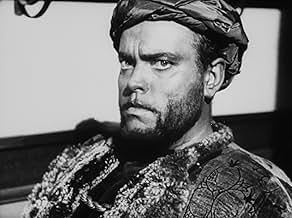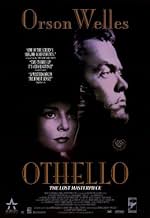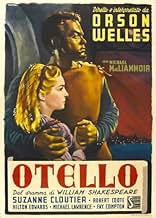La tragedia de Otelo, el moro de Venecia
Título original: The Tragedy of Othello: The Moor of Venice
CALIFICACIÓN DE IMDb
7.5/10
10 k
TU CALIFICACIÓN
Un general moro es manipulado para albergar la idea de que su esposa le es infiel.Un general moro es manipulado para albergar la idea de que su esposa le es infiel.Un general moro es manipulado para albergar la idea de que su esposa le es infiel.
- Dirección
- Guionistas
- Elenco
- Premios
- 1 premio ganado y 1 nominación en total
Abdullah Ben Mohamet
- Pageboy
- (sin créditos)
Joseph Cotten
- Senator
- (sin créditos)
Jean Davis
- Montano
- (sin créditos)
Joan Fontaine
- Page
- (sin créditos)
Robert Rietty
- Lodovico
- (voz)
- (sin créditos)
Gudrun Ure
- Desdemona
- (voz)
- (sin créditos)
- Dirección
- Guionistas
- Todo el elenco y el equipo
- Producción, taquilla y más en IMDbPro
Opiniones destacadas
The power of Welles performance should make anyone not already an admirer stand up and take notice. The dark, brooding nature of Welles character sets the tone throughout this film. Each of the prominent characters seems to feed off this intensity, making each the better for it. The spartan sets and excellent use of lighting add to this powerful delivery making the words feel true and soul wrenching. I think this production could have been played out on a bare stage and still be regarded as a fine work, the dialogue and delivery is of such fine caliber. "The Moor of Venice" is a fine example of Orson Welles vast talents as a performer and director and should not be missed.
Othello, Moor of Venice, loves Desdemonda. Unbeknownst to him, one of his lieutenants, Iago, seething with jealousy, plans to bring him down. Iago slowly builds a web of deceit and lies around Othello that leads him to question the faithfulness of his wife and men, ultimately pushing him to far...
Many a time has a white actor portrayed black Othello. Thankfully, Welles excels in the title role, his hurt palpable. In adapting Shakespeare's play, Welles has done away with subplots he deemed unnecessary. His "Othello" boils down to the title character, his wife, Iago and bit players (and impressive numbers of extras). Fans of the text may regret the absence of a character or the significant reduction of his/her importance. It diminishes the play but enhances the film, giving it a tighter focus and a more fluid structure and running time. But as always, we expect more from an Orson Welles film.
Orson Welles is mostly celebrated for reinventing the look of film. His pictures each possess a unique aesthetic and daring camera work. Othello holds its own even when measured against the impressive Welles oeuvre, a true miracle if you are familiar with the films' history. Shooting it over years and in different locations (Morocco, Spain, etc.) with variations, often within the same scene, Welles managed to create the watertight illusion of a coherent world, leading the viewer to imagine that lavish sets and locations were available. For anyone interested in editing or any other aspect of film-making, this is an indisputable milestone in directorial resourcefulness.
Othello was Welles's second Shakespeare interpretation as star and director, soaring high above his very interesting Macbeth. He would return to the Bard one last time with his apotheosis, Chimes at Midnight. This trilogy is a gift. What a joy it is to see America's greatest director work with the world's greatest playwright...
Many a time has a white actor portrayed black Othello. Thankfully, Welles excels in the title role, his hurt palpable. In adapting Shakespeare's play, Welles has done away with subplots he deemed unnecessary. His "Othello" boils down to the title character, his wife, Iago and bit players (and impressive numbers of extras). Fans of the text may regret the absence of a character or the significant reduction of his/her importance. It diminishes the play but enhances the film, giving it a tighter focus and a more fluid structure and running time. But as always, we expect more from an Orson Welles film.
Orson Welles is mostly celebrated for reinventing the look of film. His pictures each possess a unique aesthetic and daring camera work. Othello holds its own even when measured against the impressive Welles oeuvre, a true miracle if you are familiar with the films' history. Shooting it over years and in different locations (Morocco, Spain, etc.) with variations, often within the same scene, Welles managed to create the watertight illusion of a coherent world, leading the viewer to imagine that lavish sets and locations were available. For anyone interested in editing or any other aspect of film-making, this is an indisputable milestone in directorial resourcefulness.
Othello was Welles's second Shakespeare interpretation as star and director, soaring high above his very interesting Macbeth. He would return to the Bard one last time with his apotheosis, Chimes at Midnight. This trilogy is a gift. What a joy it is to see America's greatest director work with the world's greatest playwright...
THE TRAGEDY OF OTHELLO: THE MOOR OF VENICE/ US/France/Italy/Morocco 1952 (3.5 STARS)
The recent restoration of Othello brings to cinematic space the magic of another masterpiece from Orson Welles. To think that a whole master negative of this film (which won the Best film at Cannes in 1952) was lying abandoned in a New Jersey warehouse, was discovered by accident and is the reason for this print that we now have access to, is enough to send shivers down the spine of any Welles-phile. . Mise-en-scene: Like with many of his other works involving especially Shakespeare, be prepared for Welles' licenses and personal interpretation of subject matter pertaining to Othello. Yet at the end, we are left with a feeling of deep tragedy and loss for Othello, played by Welles himself, and though we feel that Othello was quite an idiot, we at least feel that he was a very unfortunate idiot at that! . The problem may have been that the critical scene where Iago poisons Othello's mind and fuels his suspicion is scrappy and left unexplored. This may well have had little to do with Welles' artistic choices, and more with his monetary situation at the time. Welles' penury through his European sojourn is widely known and the passion with which he would invest into his films, every penny earned through moonlighting his booming voice and above-average acting skills is legendary, and should put this in context.
. The figure behavior of Micheál MacLiammóir is utterly convincing as the detestable Iago who is consumed by jealousy and rage at being overlooked as the second-in-command. But the person to steal our hearts is Suzanne Cloutier who portrays the fair-dame Desdemona. She is every bit as dainty as we would have imagined her to be. . The stripped down set design works wonderfully for the film and even though budgets may have been the driving force, Othello's barren palace is preceded only by the barrenness of his blinding jealousy and irrational actions. . Cinematography: As we have come to expect, Orson Welles has a unique cinematic language, through which he creates a Wellesian world of skin-burning close ups, dutched crazy world-frames and low angle shots to create a tense atmosphere of foreboding. But there is no better example of exploring and using frame depth than in Othello. Time and again Welles plays with foreground element to reveal psychologically subjective and meta-diagetic moods while cleverly using the depth in the frame to forward the narrative and plot the next progression. The title shots of the film are harrowing in their effect, with the interplay of high-contrast earth and sky contours that at once establish the mood for an intense cinematic experience. . Sound & Editing: The restored version has a brand-new soundtrack mentored by Welles' daughter, and while it enhances the experience to telling effect, it is irony to note that just the new soundtrack cost much more than what Welles assembled the whole film for. The fact that parts of the film were shot MOS and other parts used ADR is distracting due to the obvious lack of lip-sync, but in the final analysis, we watch Welles with reverence almost as if on a visit to Sunday Mass, paying homage, never once forgetting that were are witness to a filmmaker stripped of resources, devoid of many essential tools, but one with indomitable spirit who refused to be cowed-down. Othello is magical in its story telling and another worthy showcase of the genius of Orson Welles.
The recent restoration of Othello brings to cinematic space the magic of another masterpiece from Orson Welles. To think that a whole master negative of this film (which won the Best film at Cannes in 1952) was lying abandoned in a New Jersey warehouse, was discovered by accident and is the reason for this print that we now have access to, is enough to send shivers down the spine of any Welles-phile. . Mise-en-scene: Like with many of his other works involving especially Shakespeare, be prepared for Welles' licenses and personal interpretation of subject matter pertaining to Othello. Yet at the end, we are left with a feeling of deep tragedy and loss for Othello, played by Welles himself, and though we feel that Othello was quite an idiot, we at least feel that he was a very unfortunate idiot at that! . The problem may have been that the critical scene where Iago poisons Othello's mind and fuels his suspicion is scrappy and left unexplored. This may well have had little to do with Welles' artistic choices, and more with his monetary situation at the time. Welles' penury through his European sojourn is widely known and the passion with which he would invest into his films, every penny earned through moonlighting his booming voice and above-average acting skills is legendary, and should put this in context.
. The figure behavior of Micheál MacLiammóir is utterly convincing as the detestable Iago who is consumed by jealousy and rage at being overlooked as the second-in-command. But the person to steal our hearts is Suzanne Cloutier who portrays the fair-dame Desdemona. She is every bit as dainty as we would have imagined her to be. . The stripped down set design works wonderfully for the film and even though budgets may have been the driving force, Othello's barren palace is preceded only by the barrenness of his blinding jealousy and irrational actions. . Cinematography: As we have come to expect, Orson Welles has a unique cinematic language, through which he creates a Wellesian world of skin-burning close ups, dutched crazy world-frames and low angle shots to create a tense atmosphere of foreboding. But there is no better example of exploring and using frame depth than in Othello. Time and again Welles plays with foreground element to reveal psychologically subjective and meta-diagetic moods while cleverly using the depth in the frame to forward the narrative and plot the next progression. The title shots of the film are harrowing in their effect, with the interplay of high-contrast earth and sky contours that at once establish the mood for an intense cinematic experience. . Sound & Editing: The restored version has a brand-new soundtrack mentored by Welles' daughter, and while it enhances the experience to telling effect, it is irony to note that just the new soundtrack cost much more than what Welles assembled the whole film for. The fact that parts of the film were shot MOS and other parts used ADR is distracting due to the obvious lack of lip-sync, but in the final analysis, we watch Welles with reverence almost as if on a visit to Sunday Mass, paying homage, never once forgetting that were are witness to a filmmaker stripped of resources, devoid of many essential tools, but one with indomitable spirit who refused to be cowed-down. Othello is magical in its story telling and another worthy showcase of the genius of Orson Welles.
Commenting on Shakespeare films is rather like admiring Easter Eggs.
First the inside: this was never a great play, relative to Shakespeare's other works. His great plays are about ideas, with characters as vectors to prod and activate them. This play is merely about characters, which makes it attractive to actors. That's certainly why Welles selected it.
Welles is the Sinatra of dramatic reading, with phrasing mastered in his radio days. All else is acceptable (at least to my tastes) so far as the play goes.
Now the shell, and here is what makes this film one of the most important. When Welles moved into film, he did so as an architect. He understood that great film constructs a space that includes the audience. So he worked with the most direct tools, buildings themselves. These sets are remarkable. I cannot imagine how he found them, how he could have seen the possibilities.
Selection aside, how he uses the spaces! View this film at least once in silence. I rate Welles as one of the 20th century's great architects and predict that this film will be mined when we get around to really creating cyberbuilding.
First the inside: this was never a great play, relative to Shakespeare's other works. His great plays are about ideas, with characters as vectors to prod and activate them. This play is merely about characters, which makes it attractive to actors. That's certainly why Welles selected it.
Welles is the Sinatra of dramatic reading, with phrasing mastered in his radio days. All else is acceptable (at least to my tastes) so far as the play goes.
Now the shell, and here is what makes this film one of the most important. When Welles moved into film, he did so as an architect. He understood that great film constructs a space that includes the audience. So he worked with the most direct tools, buildings themselves. These sets are remarkable. I cannot imagine how he found them, how he could have seen the possibilities.
Selection aside, how he uses the spaces! View this film at least once in silence. I rate Welles as one of the 20th century's great architects and predict that this film will be mined when we get around to really creating cyberbuilding.
I will not go into the film as many already have said how it is a great work of art despite its "troubled" filming history.
This film is now advertised and available as a "restored" dvd of a "lost" Welles film. But DO NOT be deceived. Whereas the 1998 cut of Touch of Evil was "restored" using a Welles memo as guidelines, Othello was restored by presuming many things. First, dialogue was put in sync and unintelligible diaglogue was "voiced over." And second, the original score was redone, but not exactly as the original. You could almost say a new score was used in the "restored" film. The original cut was Welles' 1952 European version which has only ever been availible as a (OOP) 1995 Criterion LaserDisc. As Welles' daughter owns the rights to Othello, that's the 1992 "restored" version which she also helped on, it is the only one currently availible for purchase in the US (as she receives no money for the 1995 CR laserdisc, she forced Criterion to stop making it.)
While many casual fans will not notice or care about the little changes, don't be deceived into thinking this is "Orson's intended version." Also DO NOT be deceived into thinking this is a lost film. It was only lost in the sense that it had no distribution until the early 90's.
This film is now advertised and available as a "restored" dvd of a "lost" Welles film. But DO NOT be deceived. Whereas the 1998 cut of Touch of Evil was "restored" using a Welles memo as guidelines, Othello was restored by presuming many things. First, dialogue was put in sync and unintelligible diaglogue was "voiced over." And second, the original score was redone, but not exactly as the original. You could almost say a new score was used in the "restored" film. The original cut was Welles' 1952 European version which has only ever been availible as a (OOP) 1995 Criterion LaserDisc. As Welles' daughter owns the rights to Othello, that's the 1992 "restored" version which she also helped on, it is the only one currently availible for purchase in the US (as she receives no money for the 1995 CR laserdisc, she forced Criterion to stop making it.)
While many casual fans will not notice or care about the little changes, don't be deceived into thinking this is "Orson's intended version." Also DO NOT be deceived into thinking this is a lost film. It was only lost in the sense that it had no distribution until the early 90's.
¿Sabías que…?
- TriviaWhen he made La rosa negra (1950), Orson Welles insisted that the coat his character wore be lined with mink, even though the lining would never be visible in the finished film. The producers acquiesced to this demand. When the shoot was over, the coat disappeared. In "Othello", Orson Welles can be seen wearing the same coat, complete with mink lining.
- Versiones alternativasThis film by Orson Welles, was 'restored' by a group in Chicago in 1991/2. The film was transferred to, and enhanced in video, (D1 format) retaining it as black and white. The audio was completely rebuilt, including the score, in Stereo Surround. All dialogue, however was original. This was a problem as some of the dialogue was distorted and unintelligible. John Fogelson, editor, was a major supervisor of the project. Ed Golya, Lorita DeLacerna, and Steve Wilke, were digital editors. And Ed Golya remixed the soundtrack. The process took 9 months. It was purchased for distribution by Castle Hill, and taken to New York where it went through another transformation before release. The restoration engineer in New York, Paul Michael, restored the audio that was supplied on 35mm optical negatives. He was able to remove the distortion, optical pops and surface noise that is inherent with Optical negatives. The restored audio was then sent to Sound One for the final mix. Unintelligible dialogue was replaced with 'sound-alikes'. This decision was made for the entertainment value of the film. The original mono music was then reintroduced into the final product. Basically, the film was retransferred, and the rebuilt sound effects tracks were added. This was done at Sound One, in NYC.. The credits were adjusted to place Lee Dickter (sp?) as Re-recording Mixer, and Ed Golya as Sound Effects Editor.
- ConexionesEdited into Histoire(s) du cinéma: La monnaie de l'absolu (1999)
Selecciones populares
Inicia sesión para calificar y agrega a la lista de videos para obtener recomendaciones personalizadas
- How long is Othello?Con tecnología de Alexa
Detalles
- Fecha de lanzamiento
- Países de origen
- Sitios oficiales
- Idiomas
- También se conoce como
- Othello
- Locaciones de filmación
- Castle, El Jadida, Morocco(cistern interior)
- Productoras
- Ver más créditos de la compañía en IMDbPro
Taquilla
- Total en EE. UU. y Canadá
- USD 28,980
- Fin de semana de estreno en EE. UU. y Canadá
- USD 6,010
- 27 abr 2014
- Total a nivel mundial
- USD 28,980
- Tiempo de ejecución
- 1h 30min(90 min)
- Color
- Relación de aspecto
- 1.37 : 1
Contribuir a esta página
Sugiere una edición o agrega el contenido que falta









































